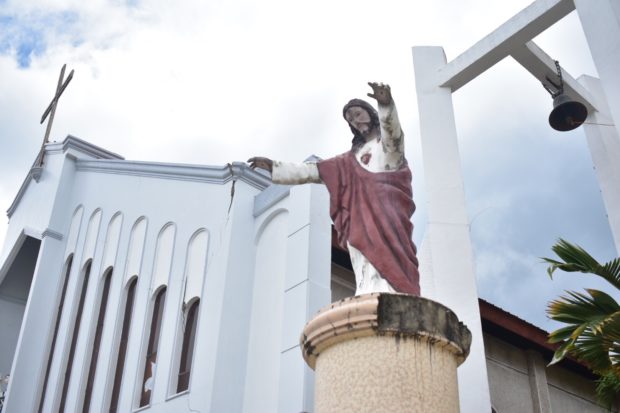
DAMAGED CHURCH The façade of St. Vincent Ferrer parish church in Cataingan, Masbate, needs to be demolished and rebuilt after it was damaged by the strong earthquake that hit the province on Tuesday. —SUZENE CAJEGAS
CATAINGAN, Masbate, Philippines —Local officials scrambled not only to feed and give refuge to thousands of residents displaced by Tuesday’s 6.6-magnitude earthquake but to act on a more pressing concern: a possible spread of the new coronavirus disease (COVID-19).
With municipal coffers depleted after months of spending on health and security needs during the pandemic, the local government of quake-stricken Cataingan in Masbate province is begging for help.
The town had been placed under a state of calamity when the COVID-19 outbreak started to allow the local government to use its calamity fund to set up quarantine facilities, deploy front-liners and guard its borders. Now, it has no money to feed and shelter residents displaced by the earthquake.
Mayor Felipe Cabataña said at least 60 percent of the 50,000 residents were forced to leave their damaged homes, forcing them to cram people in school buildings used as evacuation centers.
But Cabataña feared a surge of COVID-19 cases because physical distancing would be “extremely difficult” to enforce in the shelters.
Cataingan has six confirmed COVID-19 patients, all of whom are in a secured isolation area, the mayor said. But officials were forced to place elsewhere 96 residents returning from other parts of the country after the town’s quarantine centers were destroyed by the quake.
Those staying at Cataingan Astrodome and Cataingan Municipal College were transferred to their village isolation units, while some were allowed to go home after completing their 14-day mandatory quarantine, according to Dr. Lalaine Villasis, provincial health officer.
Challenging
Villasis said it would be “challenging” to house returnees in Cataingan, especially now that borders of the province have reopened.
“Our concern is that if the facilities in Cataingan would not be available by then, that would be challenging,” she said. “Although there are plans where to house them, it would still be challenging for health-care workers.”
Reports from the Office of Civil Defense in Bicol said Cataingan District Hospital suffered “partial damage” and tents were set up outside the facility to accommodate two patients.
THE DAY AFTER Workers of a glassware shop in Cataingan, Masbate, start cleaning up their store of broken glass a day after the earthquake left widespread damage in the town. —SUZENE CAJEGAS
Tents needed
“There are really many cracks inside and patients stay in the lobby,” Villasis said on Wednesday, adding that the chief of hospital and staff were forced to sleep outside due to the damage. “We are in dire need of tents which will be used as temporary shelters because the houses were damaged,” Cabataña told the Inquirer.
He said at least 200 tents were needed for residents in 36 villages, many of them hesitant to return to their homes. “They are afraid [their houses] may collapse anytime as we continue to experience aftershocks,” he said.
The Philippine Institute of Volcanology and Seismology (Phivolcs) has recorded more than 60 aftershocks since the quake struck at 8:15 a.m. on Tuesday. The latest, a 2.4-magnitude temblor 19 kilometers southeast of Cataingan, was recorded at 3:26 p.m. on Wednesday.
Infrastructure damage had been initially placed at P24 million. The municipal hall suffered cracks, forcing Cabataña to suspend work there.
Most businesses remained shut on Wednesday.
The 40-year-old St. Vincent Ferrer parish church was also damaged. Its priest, Arnel Bruza, said he was informed that the damaged façade had to be demolished and rebuilt.
Help readied
Cabataña said food packs were provided to displaced residents, but he was worried if the distribution could be sustained. “We don’t have enough budget to provide [for] the needs of our constituents because it was already used for assistance due to the COVID-19 pandemic,” he said.
Cabataña said the municipal council might have to declare a second state of calamity, but local legislators had yet to convene as they were also affected by the quake and were still attending to their families.
Malacañang assured Masbate that it would get the help it needed to recover from the earthquake, with food packs, water, blankets and other items needed in evacuation centers or resettlement areas being readied to be sent to the province, presidential spokesperson Harry Roque said on Wednesday.
Officials would also see to it that COVID-19 health protocols are observed, Roque said.
“There will be manpower also to ensure that even in temporary evacuation areas that there would be social distancing because of the threat of the COVID-19,” he said in an interview over CNN Philippines.
Roque advised people in evacuation centers not to let their guard down against the new coronavirus. “One thing going for Masbate is that they have very low cases of COVID-19, but nonetheless, they should not be too complacent; even if they will be staying in temporary shelters, they have to observe social distancing,” he added. President Duterte wants to visit Masbate but it is not certain if the trip will proceed because of restrictions on his movement due to the pandemic, Roque said.
—Reports from Suzene Cajegas, Michael Jaucian, Rey Anthony Ostria, Mar Arguelles and Leila B. Salaverria